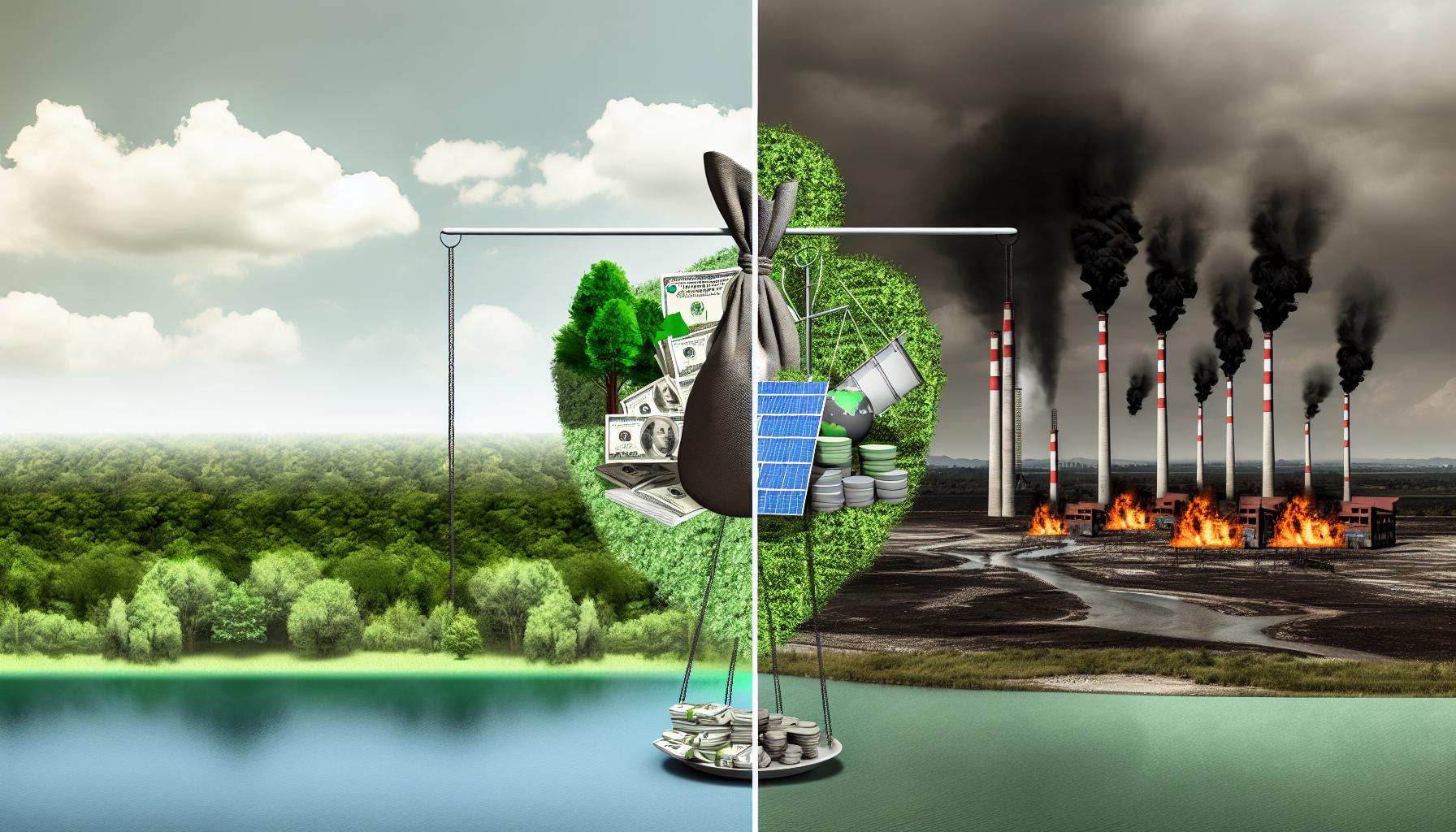Is green finance the key to unlocking environmental sustainability, or is it a potential stumbling block?
Green finance, which refers to financial instruments that promote sustainable initiatives and environmentally friendly projects, has recently gained significant attention as a potential solution to environmental challenges.
The debate surrounding green finance revolves around whether it is a curse or a benefit to environmental sustainability. Let's delve into the key arguments and perspectives on this topic.
What is Green Finance?
Green financing is a loan or investment that supports environmentally beneficial activities, such as acquiring eco-friendly products and services or developing green infrastructure. With the growing threat of environmental harm, green financing has become increasingly popular.
Curse of Green Finance
The curse of Green Finance includes various challenges and criticisms associated with its implementation and environmental impact. Some of the curses of Green Finance are:
Negative Nexus Across Different Quantiles: Green finance can generate a negative nexus across different quantiles despite being a beneficial financial instrument to curb pollution.
Detrimental Impact on Environmental Performance: Depending on the region, green finance can negatively impact environmental performance, affecting some areas due to increased green finance.
Encouraging Energy Efficiency Over Green Innovation: Green finance is criticized for only encouraging energy efficiency by developing new technology while impeding green innovation.
These challenges and criticisms highlight the complexities and potential drawbacks of implementing Green Finance despite its positive intentions toward environmental sustainability.
The Benefits of Green Finance
Green finance offers several advantages that contribute to environmental sustainability:
Encourages Technological Spread and Infrastructure Development: Green finance fuels the development of eco-friendly infrastructure, renewable energy projects, and sustainable technology.
Produces a Comparative Advantage: Green finance can provide a competitive edge as environmental regulations tighten, positioning businesses and countries favorably in a low-carbon economy.
Adds Business Value: Companies can enhance their portfolios by participating in green financing, attracting environmentally conscious investors and customers.
Enhances Economic Prospects: Governments promoting green finance help create local markets for renewable energy, leading to economic growth and job creation.
Risks and Challenges of Green Finance
Despite its benefits, green finance also faces certain risks and challenges:
Market Volatility: Economic instability can hinder the growth of green finance, impacting investor confidence in the long-term viability of green investments.
Regulatory Considerations: Stronger regulations and consistent standards are needed to ensure the credibility and effectiveness of green finance initiatives.
Greenwashing: Misleading information or false claims in green financing, known as greenwashing, can undermine the integrity of environmental efforts.
Uneven Operating Environment: The absence of standardized green finance strategies in EMDEs creates uneven competition, risking a "first mover disadvantage" and impeding sustainable finance adoption.
Regulatory Gaps: Challenges arise from regulatory gaps in many EMDEs, hindering central banks' and financial regulators' development of climate risk assessment models. Limited data and expertise often leave financial firms to handle these risks independently.
Absence of Long-Term Energy Transition Strategies: The financial industry's challenge stems from a lack of government energy transition strategies, which impact incentives, assets, and policy consistency and hinder sustainable finance progress.
Data and Capacity Gaps: Due to limited, non-granular green taxonomies, data and capacity gaps in EMDEs hinder practical, sustainable finance application and disclosure. This leads to inconsistencies in assessing climate risks and exposures, which can fuel "greenwashing" and worsen financial sector disparities.
Transition to Net Zero and Financial Sector Risks: Dealing with a net-zero carbon economy offers opportunities and risks. Sustainable policies can drive eco-friendly progress, but delays may lead to financial losses. Careful navigation is essential for stability during this transition.
Lack of Long-Term Strategies and Data Management Challenges: Improved data management and standardized frameworks are crucial for successful green finance, addressing challenges like credit distribution rules and climate risk stress-testing. Streamlining data collection and management processes is vital in enhancing green finance practices.
Green Finance vs. Sustainable Finance
Green finance focuses only on environmental issues, while sustainable finance also considers social and governance matters. Both aim to demonstrate the compatibility of economic success with sustainability goals.
Green Finance:
Green finance refers explicitly to financial products and services that address environmental factors and climate change.
- It includes investments in renewable energy, green bonds, energy-efficient infrastructure, and technologies.
- The primary goal of green finance is to provide capital for projects that reduce carbon emissions and promote sustainability.
- It focuses on financially supporting sustainable projects and technologies, primarily addressing environmental and climate-related risks.
- Green finance is more narrowly focused than sustainable finance, emphasizing environmental factors and climate change mitigation.
Sustainable Finance:
Sustainable finance is a broader concept encompassing environmental, social, and governance (ESG) factors.
- It includes not only environmental considerations but also social and corporate governance aspects.
- Sustainable finance aims to create long-term economic and societal value by making sound financial decisions considering sustainability risks and opportunities.
- It covers sustainable investing, banking, impact investing, sustainable financial product development, and shareholder activism.
- Sustainable finance is the most comprehensive term, incorporating all financing activities contributing to sustainable development, including environmental, social, and governance factors.
How Zero Circle Empowers With Green Finance?
Green finance is pivotal in environmental sustainability as a benefit rather than a curse. Zero Circle facilitates access to green financing options, empowering businesses to invest in sustainable initiatives, reduce carbon emissions, and promote eco-friendly practices.
Green finance not only aids in preserving the environment and conserving natural resources but also fosters economic development, social equality, and equitable resource access. Through sustainability reporting, compliance tracking, and supply chain transparency, green finance encourages businesses to adopt sustainable practices, lower their carbon footprint, and contribute to a safer and more livable future for all.
Overall, Green Finance, exemplified by Zero Circle, is crucial in advancing environmental sustainability and positively impacting our ecosystem.
In conclusion, the debate over whether green finance is a curse or a benefit to environmental sustainability is multifaceted. While green finance presents opportunities for positive environmental impact, it also requires careful management to address risks and ensure transparency.
Promoting green finance can help governments, businesses, and individuals contribute to a more sustainable future while reaping economic benefits. Ultimately, green finance's success lies in its ability to drive innovation, support green initiatives, and foster a harmonious relationship between finance and environmental stewardship.



